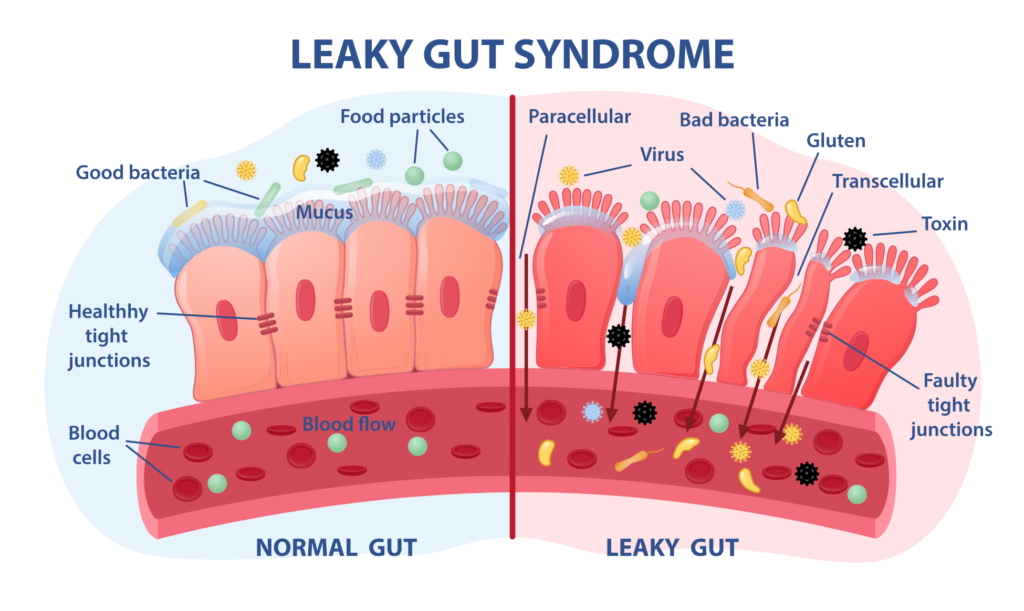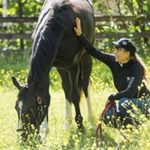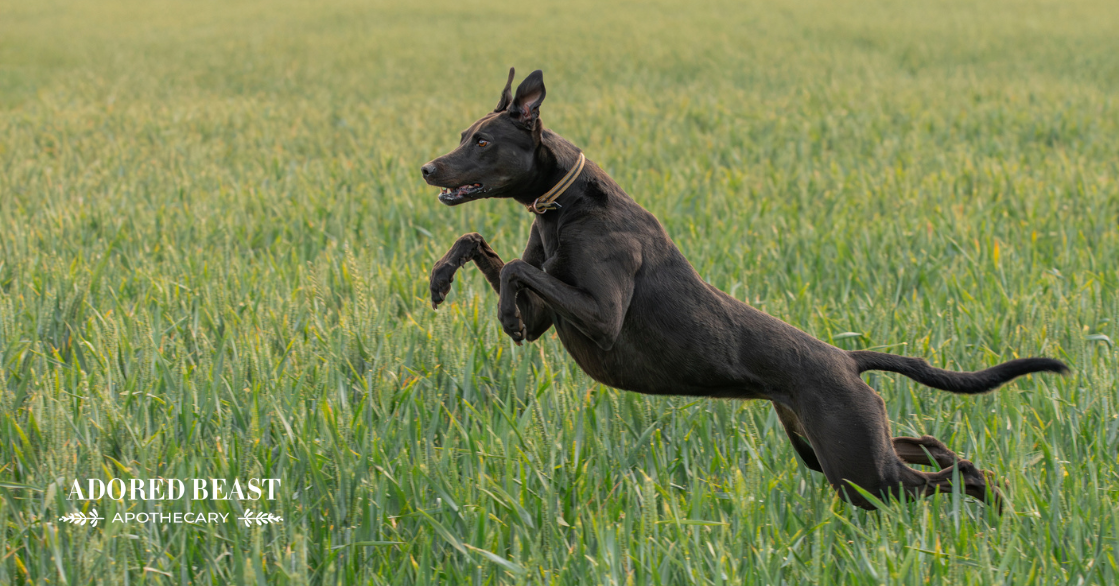Over the last 20 years, the term “leaky gut” has become well known in the wellness community. Before this, there was no tangible way to prove that it existed, and the scientific and medical communities were quick to write it off. However, with new technology and exhaustive research in the field of gastro-intestinal health, there is now a medical term for the condition: gastrointestinal dysbiosis. In the equine wellness world, we simple call it leaky gut in horses.
So, what exactly is leaky gut in horses? And once you discover damage to the gut, what can you do to help your animal?
It starts by understanding just how important the gut is to overall health.
Your Horse’s Gut
The best way to explain leaky gut in horses is by explaining how the gut works when it’s healthy.
Estimates suggest that the GI tract makes up approximately 80% of the immune system in mammals. The role and function of the digestive system is about way more than breaking down food into nutrients that the body can absorb and use throughout the entire body.
In a healthy gut, there are three major elements that work synergistically:
- The Epithelium – the lining of the gut, made up of special epithelial cells that perform a range of tasks including nutrient absorption, metabolic signaling, neurological signalling and toxin recognition and regulation.
- The Mucosa – the protective mucosal lining that sits on top of the epithelial lining of the gut. It is produced by special mucous-producing cells in the epithelium.
- The Microbiome – the unique microbial community of bacteria, fungi and viruses that inhabit the gut mucosa
The Epithelium Functions:
- cellular junctions are tightly held together by ionic charges
- the barrier between our inside and outside worlds
- absorbs nutrients from the food we eat
- decides (intelligently) which nutrients should enter the bloodstream and which waste products and toxic materials should pass into the bowel
- the protector from foreign invasion of pathogenic bacteria, fungi and viruses
- the cellular hardware of the gut that communicates with the microbiome on energetic, chemical, and genetic levels
The Mucosa Functions:
- protects the epithelium from erosion from gastric (digestive) acid and pathogens
- filled with a variety of white blood cell types that act as an immunological army for the entire body
- houses and protects the microbial community
The Microbiome Functions:
- communicates in great detail with the cells of the gut epithelium to signal digestive, metabolic, nervous system and immune system functions
- the cellular software of the gut that can be updated and re-arranged to guide the immune system in relation to the external environment
- the educator of the immune system
- has a direct effect on gene expression
- produces “post-biotic” metabolites that aid in protecting against pathogens and the modulation of the immune system (eg. inflammatory processes)
When the gut is healthy, and the body can perform these functions, your horse will naturally be healthier.
However…
What Happens with Leaky Gut in Horses
Thankfully, healthcare professionals and scientists now recognize dysbiosis. It is a disease of the gut but it affects every system in the body. That is why it has worked its way up the ladder in popularity in the field of scientific research.
Each gut is unique in its microbial community depending on diet, lifestyle, air quality, water quality, geographic location, climate, medications, and even stress levels.
A horse’s gut can become compromised by multiple factors, including:
- diet
- glyphosate (AKA Roundup)
- feeding frequency
- lifestyle – increased/prolonged mental or physical stress
- medications including NSAIDs and antibiotics
- sleep disorders
- lack of movement
These factors can cause damage to the mucosal lining. As the mucosa erodes, it can create holes, leaving the epithelium exposed to gastric acid. This is how ulcers develop. As the mucosa erodes and the epithelium becomes more inflamed, the microbiome becomes compromised, making it increasingly difficult for the good bacteria to survive. Then, the cells lose their ionic charges and break apart, allowing toxic matter to seep into the bloodstream. This is where the name “leaky gut” comes from.
Additionally, metabolites cease to be synthesized and the cells cease communicating with each other, dysregulating digestive, endocrine, and immune functions. This can affect ANY system, increasing inflammation throughout the entire body. It can manifest as IBS, colic, liver disease, kidney disease, allergies, hives, skin disease, asthma, arthritis, hoof growth issues, and even neurological/behavioral issues and metabolic dysregulation (eg. insulin resistance).
Here’s what it looks like:

The other disadvantage of a damaged gut is the impairment of its ability to digest and absorb nutrients from food. You could be feeding all the best food and supplements in the world but your horse could still be starving if their gut is severely damaged. This leaves your horse susceptible to nutritional deficiencies which can also present as a variety of disease pictures.
10 Ways to Help Heal Leaky Gut in Horses
If your horse is suffering from any of the above issues, it’s imperative to investigate their gut health. Even if you don’t scope your horse, you can still treat them as if there is GI damage with no ill effects. Work on a plan to support and repair the GI tract.
There are so many ways that you can help rebuild and rebalance the gut to help it heal. These 10 tips will help address leaky gut in horses, and get things back on track:
- Eliminate glyphosate from the diet – ingredients that contain glyphosate include wheat, corn, soy, sugar beets (beet pulp), alfalfa and flax. Switch to non-GMO or certified organic whole foods.
- Eliminate starch and sugar – this includes things like molasses, highly processed/extruded feeds that contain grain or legumes, high-sugar hay and unmanaged forage.
- Take a close look at your horse’s diet – assess exactly how much protein and fat they need from clean sources of food.
- Evaluate your horse’s feeding schedule – are they on pasture or being fed regularly (every 3-4 hours)? Horses need to forage all day to avoid gastric ulcers.
- Use herbs and nutraceuticals to help repair the gut and nourish it – this will not only help with immune function, but also help your horse absorb nutrients correctly. Herbs and nutraceuticals to consider:
- marshmallow root
- slippery elm bark
- aloe vera
- liquorice root
- L-glutamine
- n-acetyl glucosamine
- probiotics
- Get a nutritional blood profile done on your horse – check to see if they have any major mineral or vitamin deficiencies, especially folate or B12. If either of these are low, the likelihood of gut damage is high.
- Do a stress management assessment – if you’re not sure how to tell if your horse has emotional stress, hire a professional to help you. Stress reduction is important for breaking the cycle of gut inflammation.
- Allow your horse to graze – if you can’t turn them out full time, do as much hand grazing as possible to give them access to fresh forage, to reduce stress, and expose them to dirt!
- Get your horse moving – movement can help to improve ulcers in horses. It increases systemic oxygenation to promote healthy microbial cultures in all body systems. Pathogenic bacteria often thrive in low oxygen environments (anaerobic/bacteria). Example: if your horse is in a stall for 12 hours a day, consider moving them into an in/out situation instead. If they are able to go out on well-managed pasture, that is ideal.
- Seriously review those medications – if severe ulcers are present, medications like omeprazole and sucralfate may be indicated for initial repair but they will not be enough to fix the problem for the long term. Horses may improve on medications and then deteriorate once they come off again. This is because steps 1-9 are often ignored. If you want long term change, you must look at the overall picture and the root causes.
If you’d like to dive in further, check out our other articles on equine gut health:












